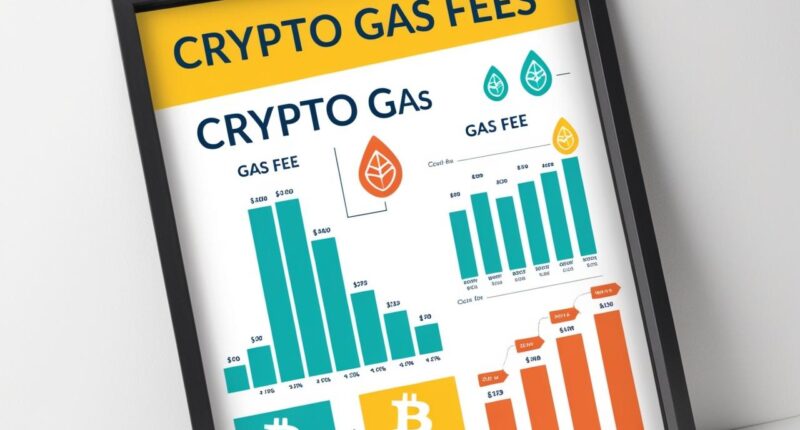Gas fees in cryptocurrency are payments made to process and validate transactions on blockchain networks. These fees compensate miners and validators for their work, ensuring the network operates securely and efficiently. Gas fees fluctuate based on network congestion and transaction complexity. They help prevent spam transactions while allowing users to prioritize urgent transactions by offering higher fees. Understanding gas fees is essential for making informed choices in cryptocurrency transactions, and further details can enhance your insight.
Gas fees are an important component of cryptocurrency transactions, representing the costs required to process and validate transactions on blockchain networks. These fees are measured in small units of cryptocurrency and serve to compensate validators or miners who process transactions. The amount of gas fees can vary considerably based on the level of network congestion and the complexity of the transaction, making them vital for both the security and operation of the network.
The primary purpose of gas fees is to prevent spam transactions and guarantee efficient allocation of network resources. By requiring a fee, the system incentivizes validators and miners to process transactions, which helps maintain the blockchain’s integrity. Additionally, gas fees fund ongoing development and maintenance efforts within the blockchain ecosystem, supporting its sustainability. Users can also prioritize urgent transactions by offering higher fees, making the system more flexible. Gas fees are essential in protecting against spam attacks by making it costly for bad actors to overload networks.
Calculating gas fees involves multiplying the gas limit, which is the maximum amount of computational units allowed, by the gas price, the cost per unit of gas, typically expressed in Gwei. This pricing is dynamic, influenced by network demand; during times of high congestion, users might face higher fees. Importantly, any unused gas is refunded to the transaction sender, guaranteeing that they only pay for what is consumed. Understanding gas fees’ impact on user costs can help individuals make more informed decisions regarding their transactions.
Several factors can affect the gas fees that users encounter. These include network congestion levels, the complexity of transactions—particularly those involving smart contracts—and the overall scalability of the blockchain. As cryptocurrency prices fluctuate, the market demand for block space can also impact fees, making them a variable cost for users.
Higher fees during peak times can create barriers for small-value transactions and influence users’ choices regarding blockchain usage. Strategies to mitigate gas fees include using estimators for ideal transaction timing, implementing Layer 2 solutions, and considering alternative blockchains with lower fees.
As the industry evolves, future developments may lead to reduced fees and improved efficiency in cryptocurrency transactions.
Frequently Asked Questions
How Can I Reduce My Gas Fees When Trading?
To reduce gas fees when trading, one should monitor gas price trackers and execute transactions during off-peak hours, such as nights or weekends.
It’s beneficial to utilize Layer 2 solutions like Optimism or Arbitrum for lower fees and faster transactions.
Additionally, adjusting transaction settings, like gas limits and speeds, can help optimize costs.
Exploring alternative methods, such as batching transactions or using alternative blockchains, can further minimize expenses associated with trading.
Do Gas Fees Change Based on Network Congestion?
Gas fees do indeed change based on network congestion.
When many users attempt to make transactions simultaneously, competition for block space increases, causing gas prices to rise. Events like NFT launches or periods of high trading activity can lead to significant spikes in fees.
Conversely, during quieter times, such as holidays, fees may decrease.
Tools like gas trackers can help users monitor these fluctuations and plan transactions more efficiently.
What Happens if I Don’t Pay Gas Fees?
If a user does not pay gas fees, their transaction will not be processed by the network. This results in the transaction being rejected, remaining in a pending state indefinitely without transferring any funds.
Additionally, other transactions may become stuck due to network congestion, leading to further delays. Without gas fees, users risk missing out on time-sensitive opportunities and may face financial losses if critical transactions fail to execute.
Are Gas Fees the Same for All Cryptocurrencies?
Gas fees are not the same for all cryptocurrencies. Different blockchains have unique fee structures influenced by factors such as network congestion, consensus mechanisms, and transaction complexity.
For example, Ethereum often experiences high and volatile gas fees, sometimes exceeding $50, while Bitcoin fees usually range from $1 to $5.
In contrast, newer blockchains like Solana and Polygon offer considerably lower fees, making them more appealing for smaller transactions and dApp development.
How Do Gas Fees Affect Transaction Speed?
Gas fees greatly influence transaction speed in blockchain networks. Higher gas fees prompt miners and validators to prioritize those transactions, resulting in faster processing.
Conversely, low gas fees can lead to delays, as these transactions may remain unprocessed during periods of high network congestion. Users can expedite their transactions by raising the gas price, especially during peak usage times, where gas fees are typically at their highest due to increased demand.
References
- https://trakx.io/resources/insights/ethereum-gas-fees-crypto/
- https://osl.com/academy/article/gas-fees-the-essential-cost-of-blockchain-transactions
- https://www.gemini.com/cryptopedia/what-are-gas-fees-gwei-gas-fees-eth-ether-transaction-fee
- https://www.kvarnx.com/en/content/understanding-crypto-gas-fees
- https://blog.obiex.finance/what-are-gas-fees-in-crypto/
- https://www.investopedia.com/terms/g/gas-ethereum.asp
- https://trustwallet.com/blog/cryptocurrency/what-are-gas-fees-in-crypto
- https://hub.easycrypto.com/what-are-gas-fees-and-how-do-they-work
- https://www.web3labs.com/blockchain-explained-what-are-gas-fees
- https://osl.com/academy/article/what-are-network-and-gas-fees/









